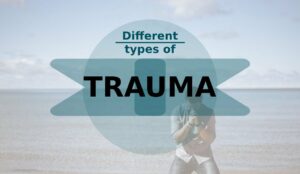Contents
What Is Trauma?

Trauma is a harrowing experience that might seem too much to handle. But the first step in healing is talking about it. Trauma can happen anywhere, including at home, at work, and on the streets. It’s not always easy to identify trauma. Because it often looks like a normal reaction to a terrible event that you could never be prepared for. Keep reading to learn more about what trauma is, signs and symptoms of this condition, treatment options. And ways to cope with traumatic events.
Symptoms Of Trauma
Trauma is often hard to identify because the symptoms look like a normal reaction to such a terrible event that you could never be prepared for. For some people, trauma has immediate effects such as shock, intense fear, numbness or detachment from reality, and difficulty concentrating. Other people may not realize they are suffering from trauma until months or years later when they experience flashbacks, nightmares, and triggers.
Given the fact that trauma symptoms look like a normal reaction to a terrible event. It can be difficult to recognize if you’re actually suffering from trauma. There are many ways to identify if you have been traumatized and need professional help, including:
- Not being able to stop thinking about the event(s)
- Feeling emotionally numb and detached from other people, things you used to love, or your future plans
- Dreaming about the event(s), experiencing flashbacks that cause you to re-live them, or feeling as if they are happening all over again
- Feeling as though there is danger everywhere, which causes you to be constantly on edge
- Experiencing irritability, outbursts of anger, or having an increased heart rate
Types Of Trauma

Although there are different kinds of traumatic events, such as assaults and natural disasters, many people describe their experiences with a single event as a trauma.
Emotional Trauma- a form of trauma that involves a psychological response to a terrible event. These can be challenging because they’re often not as visible as other forms of trauma, making it hard for people to understand what you’re going through.
Psychological Trauma- this type of trauma can affect your mind and cause you to lose touch with reality. This may happen as a result of an intense or prolonged experience that impacted how you saw yourself or the world around you.
Physical Trauma- this type of trauma involves experiencing, witnessing, or being confronted with physical harm. It can involve anything from car accidents to severe burns to broken bones.
Somatic Trauma- this type of trauma involves physical harm that is not usually visible. For example, losing a loved one can be traumatic because it’s an intense and painful experience even though the loss may not immediately be apparent to others around you.
How Trauma Affects Daily Life?

Trauma has a huge impact on our health. Whether it is physical or mental, It can show in various forms. The effects could be-
- Injuries
broken bones or cuts requiring medical attention, especially those sustained during the traumatic event. People may assume your injury was related to the trauma when in fact, it’s often a way for people to avoid talking about emotions and psychological reactions.
Intrusive memories
Involuntary memories may cause strong negative feelings such as fear, sadness, or anger. These can occur at any time and without warning, making it difficult to lead a normal life.
Flashbacks
A type of intrusive memory that is often triggered by triggers that are not present when the traumatic event originally occurred. These flashbacks can feel very real and can cause intense physical sensations such as pain, dizziness, or nausea.
Avoiding reminders
Anything you avoid because it’s linked to the trauma or because thinking about it brings up strong negative feelings. Sometimes, avoiding reminders may feel necessary to help you cope with the trauma.
Negative mood
Intense sadness, irritability, or anger can last for months after the traumatic event occurred. A feeling that no one understands what you’re going through or that people try to avoid talking about it with you.
Physical symptoms
These include feelings of constant fatigue, lack of concentration, increased heart rate, sweating, or muscle tension. These can be very uncomfortable and make it difficult to go through daily life activities.
Sleeping difficulties
Trouble falling asleep or staying asleep that may last for months after the trauma occurred. It may feel like you have no choice but to continue going about your day when in reality. It’s incredibly important to allow yourself time for rest.
Negative thoughts
A sense of blame or guilt may prevent you from forming healthy relationships with others after the trauma occurred. You might think that other people will take advantage of you or won’t be able to understand what you’re going through. You might also feel like the trauma defines you as a person when in reality, it doesn’t have to determine who you are.
Difficulty trusting others
Difficulty allowing yourself to develop close relationships with people. Especially after experiencing an event that makes you feel vulnerable or fearful of being hurt.
Substance abuse
Drinking or using drugs in an attempt to escape difficult emotions, numb uncomfortable feelings, or forget about the trauma.
It’s important to note that some symptoms may be present immediately after the traumatic event occurred while others develop over time. This is not something you should be ashamed of- everyone reacts differently to traumatic experiences!
Reasons To Seek Help

There are many reasons that you may be hesitant to seek help. Being misunderstood by others is often a reason people put off treatment. It can feel easier to handle emotions on your own rather than explain the trauma to others. It’s also common for people to feel like they’re not deserving of care or simply ignore symptoms because they’re not life-threatening. However, seeking treatment can reduce feelings of isolation and allow you to develop coping strategies. That will hopefully make living with your trauma easier.
The process of talking about the trauma is referred to as “reprocessing.” This often occurs in a safe environment where you feel comfortable opening up about what happened. There are four steps in this process:
1. Presenting– sharing what happened during the trauma and how it is affecting your life now.
2. Re-experiencing– describing any memories, images, thoughts, or physical sensations that may have been triggered as a result of recalling the event. This stage can be hard for some people because they may feel like they’re reliving the trauma.
3. Labeling– discussing how strong or distressing certain memories are.
4. Healing– expressing any emotions that come up as a result of talking about the trauma and seeing it from a new perspective with your therapist’s help.
Doctors should consider prescribing psychotherapy, sometimes along with medications, for people who have PTSD. This type of treatment is the most effective when a person with PTSD receives assistance from a mental health professional specifically trained in this area. Psychotherapy can take place in either an individual or group setting and there are many different types of therapies for treating PTSD.
Ways To Prevent Trauma In The Future

Unfortunately, trauma can happen anywhere at any time and there’s nothing anyone can do to control that besides being prepared. If you have a history of trauma, it’s important to be able to recognize the signs and symptoms of PTSD so that you can get help if you need it. In addition, there are ways that you can prevent yourself from experiencing trauma in the future. For example, try not to make “shoulds” for your life- especially in regards to how you think your life “should” be. Instead, know that there are many ways to live a happy and fulfilled life and when you start living for yourself, it becomes much harder for trauma to affect you.
Trauma Treatment Options
After experiencing a traumatic event that may seem like it will never end. It’s important to seek treatment before your symptoms begin to affect your mood and day-to-day life. There are several different forms of therapy for trauma, including cognitive-behavioral therapy (CBT) and exposure therapy. CBT helps you identify unhealthy coping mechanisms to replace with healthier tools that can help you deal with stress. Exposure therapy is a gradual exposure to trauma memories that help them feel less threatening.
Therapy- From CBT to Exposure
Depending on the type of trauma you experienced, your treatment options may include cognitive-behavioral therapy (CBT) or exposure therapy. CBT is a form of psychotherapy that helps people with PTSD re-frame their experiences in order to decrease the intensity of certain mental reactions. This process can help you identify unhealthy forms of coping. Such as avoidance and emotional numbing, to replace those with healthier options that will help you deal with stress.
Exposure therapy is a gradual exposure to trauma memories that helps them feel less threatening. In this type of treatment, the therapist guides the patient through a safe exploration of their memories. In order to have a better understanding of how they relate to the patient’s current emotional state.
The most important thing to remember when coping with a traumatic event is that you are not alone. Your story is important and deserves to be heard. So know that there are people who want to listen. In addition, try taking care of yourself in ways that feel right for you. Whether it’s talking to a friend, listening to music, or enjoying a walk outside. Whatever you feel will help you recover from your traumatic event, stick with it- there’s no wrong way to heal.
Tips for Coping with Traumatic Events

After experiencing a traumatic event, it can be difficult to go back to normal life without feeling anxious, frightened, or depressed. These are all normal feelings that should decrease over time. However, if your symptoms last longer than 4 weeks or interfere with your ability to go to work or school, you should seek professional help. If you’re looking for ways to cope with your symptoms and emotions until then, there are healthy ways that can help:
• Try not to avoid people and things that remind you of the event(s). These reminders may be triggers that activate your memories of the trauma. Instead, find ways to be around these people and things so you can begin processing your memories.
• Remember that you are safe now. Even if the event(s) felt like it was happening all over again or triggered feelings of danger.
• Make sure to set aside time every day for yourself where you’re not constantly thinking about the event(s). If you have a hobby or interest that relaxes you, this is a good time to engage in it.
• Spend time thinking about your future and what your goals are. Even if these seem difficult to reach right now. This can help give you something to look forward to while coping with the present.
• Don’t be afraid to reach out to friends, family members, or professionals for help. Allowing yourself the opportunity to talk about the event with someone who is understanding can be very therapeutic.
• Remember that although it may seem difficult at first, recovery from trauma is possible over time.
Conclusion
We understand that trauma can be very difficult to talk about, and we are here for you. Whether it is the result of sexual abuse, physical assault or a natural disaster. There are many reasons why someone might experience traumatic stress. If you need help coping with this type of change in your life. Please know that our team is to work with individuals who have trauma. So they can heal from their past experiences. We want people to live full lives without being haunted by pain from the past. If you are looking for therapy for trauma, reach out to our team and get the best suitable treatment.
For more information, please contact MantraCare. PTSD or Post-Traumatic Stress Disorder is a mental health condition that affects people who have experienced or witnessed a traumatic event. If you have any queries regarding Online PTSD Counseling experienced therapists at MantraCare can help: Book a trial PTSD therapy session


